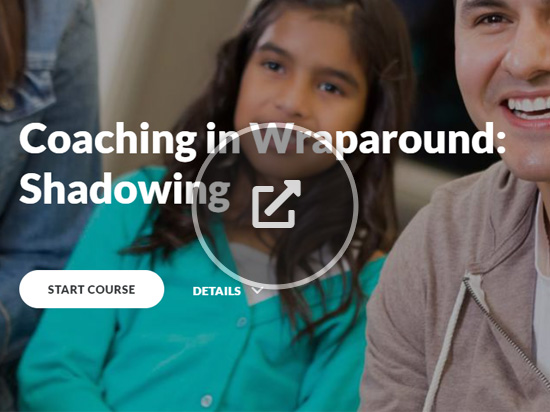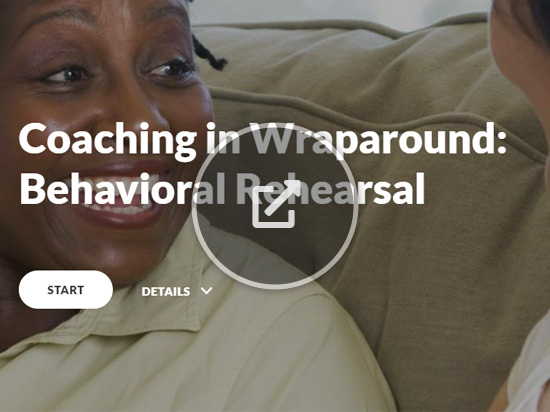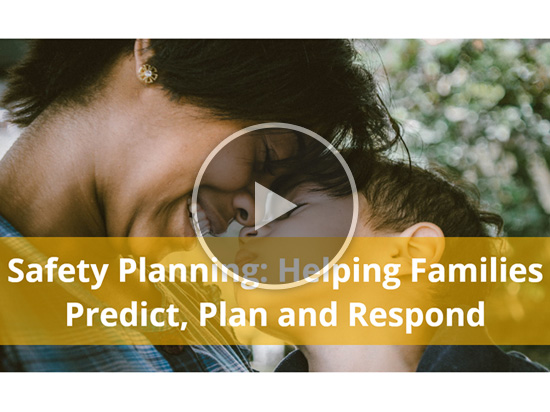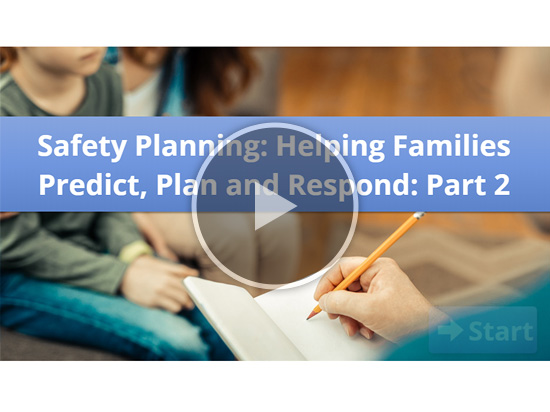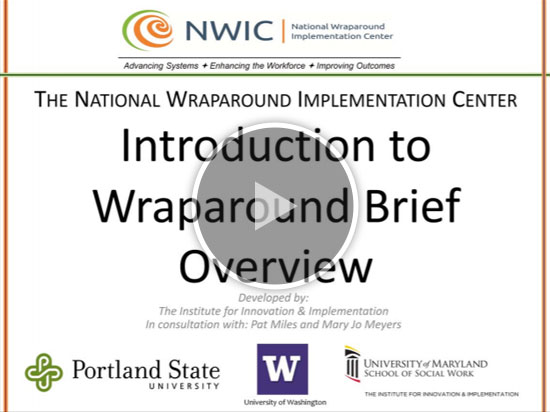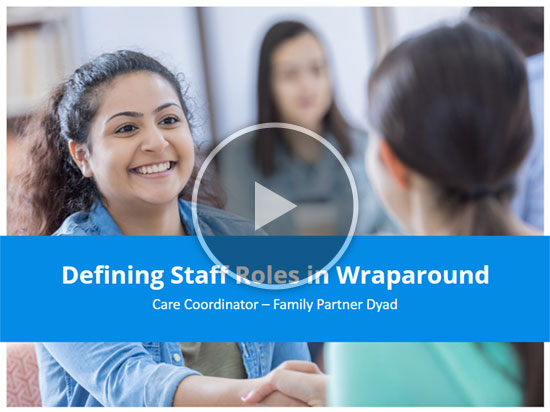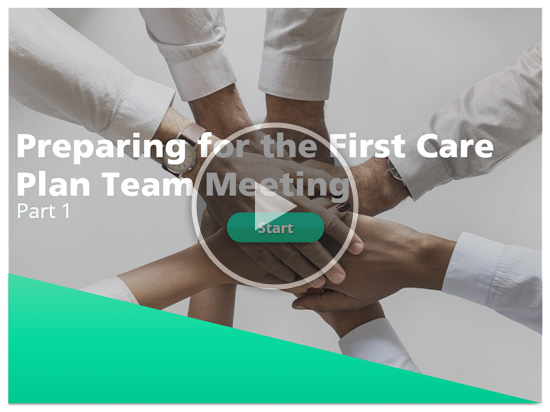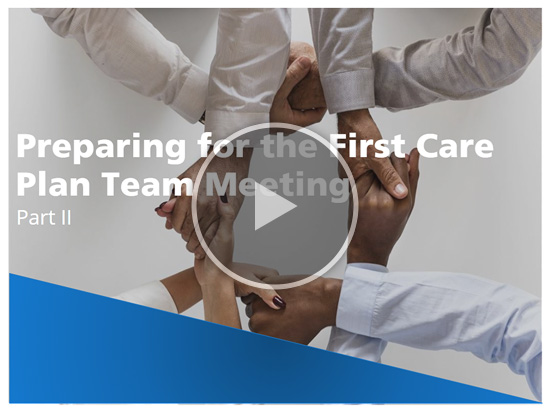This page hosts online training modules that were developed for Community Service Agencies (CSA). These modules will ground new Care Coordinators and Family Partners in the basics of Wraparound, the care planning model and philosophical foundation of Intensive Care Coordination (ICC) provided by CSAs. Seasoned Care Coordinators and Family Partners may also benefit from these modules as refresher trainings. Trainings may include an option to request a certificate of completion at the end of each training. These can be shared with supervisors or employers to demonstrate training completion.
(45 min.) As a supervisor or director in a Community Service Agency (CSA) one of your responsibilities is to serve as a coach to staff facilitating Wraparound with families. This introduction to Coaching in Wraparound will prepare for the series by examining your own learning style and considering the learning styles of your team; reflecting on strength-based supervision; and reviewing the four components of Wraparound: Theory of Change, Four Phases, Ten Principles, and Family Partner and Care Coordinator Skill Sets.
(30 min.) Shadowing, a form of observational learning, is the process of learning that occurs when staff observe Wraparound activities between seasoned staff and families. Paying attention, processing and storing the information are the focus of shadowing. In this module you will explore Shadowing as a coaching tool; review the action steps of Shadowing; and practice the preparation and debriefing of a Shadowing using a vignette and resources developed specifically for CSA Wraparound coaches.
(35 min.) Behavioral Rehearsal is a role-play method that provides an opportunity for the staff to act out behaviors before having that discussion with a family. In this module you will think about how you have used and could use behavioral rehearsal with staff; Review the action steps of behavioral rehearsal; and practice the preparation and debriefing of a behavioral rehearsal event using a vignette and resources developed specifically for CSA Wraparound coaches.
(60 min.) Live Coaching is a form of assessment and support of Wraparound activities with families that takes place in a safe learning environment. In this module you will think about how you can use observational tools during live coaching and debriefing to improve the quality and impact of learning on your staff using a vignette and resources developed specifically for CSA Wraparound coaches.
(30 min.) One of the most important and useful skills families can learn is safety planning. Developing a safety plan in collaboration with the youth and family that they feel committed to will help prepare the family to avoid bad outcomes and to manage their needs. In Part 1, you will think about the goals of safety planning and learn how see Functional Assessment can inform safety planning in Wraparound.
(35 min.) One of the most important and useful skills families can learn is safety planning. Developing a safety plan in collaboration with the youth and family to will help prepare the family to avoid bad outcomes and to manage their needs In Part 2 you will practice using a Functional Assessment and other Crisis and Safety Planning tools to develop flexible safety plans that can help prevent or manage unsafe behaviors.
The Institute for Innovations and Implementation offers four free, e-learning trainings related to Wraparound and healthcare. They can be found by visiting the homepage, and then selecting Trainings and Online Trainings. The Wraparound section is found toward the end of list. Each of these trainings has a pre-test and post-test and some offer a certificate of completion. You will be prompted to create a user I.D. and password to access the trainings. Please note that the trainings use Adobe Presenter and are best viewed through Internet Explorer, Microsoft Edge, or Mozilla Firefox.
- Introduction to Wraparound: Brief Overview (40 Min.)
Wraparound practitioners in Massachusetts will notice some differences in language as the examples cited in this module are from Maryland and Milwaukee (for instance, in Massachusetts we refer to the Wraparound principle of Persistence, while the University of Maryland Wraparound overview calls it Unconditional Care). That said, the basic philosophy and values of Wraparound presented within this training are consistent, regardless of state or jurisdiction.
- Somatic Healthcare for Children and Adolescents (4 modules, each approximately 40 Min.)
Modules cover Infancy, Early Childhood, Middle Childhood, and Adolescence. Each provides an overview of what happens during pediatric primary care well child visits and addresses topics such as developmental milestones, immunizations, asthma, obesity, sexually transmitted infections, and other acute conditions.
- Oral Healthcare for Children and Adolescents (15 Min.)
Provides an overview of oral health and how it contributes to overall physical health and quality of life children and adolescents.
- Systems of Care Overview (2 Hours)
Most appropriate for new Program Directors. Provides a primer for understanding the principles of the Systems of Care approach and the current state of child-serving systems, as well as the seminal document, Systems of Care by Sheila Pires.
Care Coordinators and Family Partners are an essential dyad and a key part of the care planning team for families in Wraparound. This module is an introduction to the unique relationship between care coordinators and family partners, similarities and differences, and includes practice problem-solving with scenarios.
If you want to run effective Wraparound care plan team meetings from the start, then you need to thoroughly prepare each team member. Preparing for the First Care Plan Team Meeting is a two part training that will guide you through the preparation process for families and for other team members. Part 1 focuses on preparing the family and Part 2 focuses on preparing other members of the team.
If you want to run effective Wraparound care plan team meetings from the start, then you need to thoroughly prepare each team member. Preparing for the First Care Plan Team Meeting is a two part training that will guide you through the preparation process for families and for other team members. Part 1 focuses on preparing the family and Part 2 focuses on preparing other members of the team.


